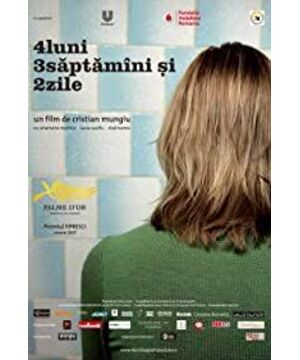Saved in silence, destroyed in silence
4 Months, 3 Weeks and 2 Days is a film set in1987 Romania, focusing on Otilia Mihartescu (Anamaria Marinca) who assists her friend and college roommate Gabita Dragut (Laura Vasiliu) in an illegal abortion from Mr. Bebe (Vlad Ivanov), written abortion and directed by Cristian Mungiu. The silence performance in this film provides the new light to the political silence and silent politically of abused and oppressed women in the male gaze and the resistance strategy of communist female subjects, as the political potential of the silence performance for the oppressed has been ignored while the researches on the forms and functions of silence is developing (Plamer-Mehta and Haliliuc, 2011).
The significant moment of the performances of silence is the rape by Mr. Bebe who is also a so-called doctor, of both Otilia and Gabita. During a thrilling hotel conversation, Bebe forces Otilia and Gabita to give him sexual favors as a precondition for the illegal abortion in the wooden language. He uses ambiguous, euphemistical and gentle tone, overused slogans, interrogative sentences and metaphors which are characteristics of wooden language, to steal the concept of inflict violence and sexually assaults with impersonal transaction between ''nice'' consenting free adults, defining the rape as the exchange of services (Plamer-Mehta and Haliliuc, 2011). At the beginning of the shot which starts from 44:30 to 51:16, Gabita sits at the edge of the bed in the hotel , Bebe's voice is from the right side of the screen, he says "there's what we'll do.I'll go to the bathroom. When I come out, you give your answer. If it's yes, tell me who goes first. If it's no, I'll get up and go." This statement is soft, whispered and even easily to be missed by the audience which seems to be a suggestion to Gabita and Otilia these two helpless girls, but actually a threat to get the license to sexually assaults upon the excepted bodies, in his own wooden style. Wooden language is a form of communist language, functioning as an idiom of depersonalization and submission by hindering individual critical thinking (Thom, 1989). The function focuses on the collective rather than the individual, producing a “forced identification” between reified interpersonal relationship (Ornatowski, 2016, p196). This ultimatum from Mr. Bebe is not only the coercion for sex,but also the coercion for the acceptance of the rules of reified female subjects and relationship by the nation and society. Bebe's voice-over appears to be easily missed, insignificant with the whole screen is full of the shot of Gabita who is in the center of the frame; however, Bebe is the one who takes control and lead the further development as the subject of the gaze, always being in the view of the bystander, while Gabita is left to have a decision in a dilemma, as well as her friend Otilia, an innocent outsider under no obligation. Gabita says to Otilia when Bebe is in the bathroom, “It's one thing to help me, it's another to ....'' The sentence is left unfinished.insignificant with the whole screen is full of the shot of Gabita who is in the center of the frame; however, Bebe is the one who takes control and lead the further development as the subject of the gaze, always being in the view of the bystander , while Gabita is left to have a decision in a dilemma, as well as her friend Otilia, an innocent outsider under no obligation. Gabita says to Otilia when Bebe is in the bathroom, “It's one thing to help me, it's another to . ...'' The sentence is left unfinished.insignificant with the whole screen is full of the shot of Gabita who is in the center of the frame; however, Bebe is the one who takes control and lead the further development as the subject of the gaze, always being in the view of the bystander , while Gabita is left to have a decision in a dilemma, as well as her friend Otilia, an innocent outsider under no obligation. Gabita says to Otilia when Bebe is in the bathroom, “It's one thing to help me, it's another to . ...'' The sentence is left unfinished.Gabita says to Otilia when Bebe is in the bathroom, “It's one thing to help me, it's another to ....'' The sentence is left unfinished.Gabita says to Otilia when Bebe is in the bathroom, “It's one thing to help me, it's another to ....'' The sentence is left unfinished.
In the last time Otilia tries to promise Bebe more money to do the abortion, but which only leads to Bebe's anger and leave. Gabita rushed to beg him to stay at the door with the handled camera following up, at this time, Otilia's voice- over comes from the inside of the room without a shot of her. From 48:36 to 49:00 of the film, Otilia does not show up on the screen with her voice constantly coming out. Finally, her voice is full of impulsion, sorrow and desperate with a kind of sob from the right side of the camera, “fine, give her the probe…” she says. Otilia still could not say out her decision, but Bebe understands that she gives up, he spit last several angry menaces at her at the entrance in a close-up shot before he turns back. The entrance is dark and the only light is on right above Bebe, and the dark,close shot enables the audience to feel the crowed, repression and breathless atmosphere in the narrow space at the entrance, carefully focusing on what Otilia will say next. However, she responds Bebe's menaces with silence.
In silence, the camera follows Bebe back to the room, sitting down, and Otilia starting to undress, no scene of rape is shown, but the whole scene indicates the rape happens. Meanwhile, the audience is in the perspective of Gabita, standing in the darkness and looking inside from the entrance, all the things in the room is exposed in the view, shaming and uncovered. Otilia is still wearing the clothes that she went to see her boyfriend in the morning, it is still light outside and the curtain is still open. Only the sound of undressing reminds Gabita and the viewers what is going to happen, as well as the sound of the panic breathe of Gabita --- she almost could not bear these, she hastens out of the room in a great rush. Of the two women,Otilia is the one who is not pregnant but fights for the abortion more effectively and actively than her pregnant friend. Otilia is sent to meet the so-called doctor Bebe first, reserve the hotel room and negotiates with Bebe of the precondition of the abortion, and she even gets around to attend the birthday dinner of her boyfriend's mother while handling all the mess, but she fights with her boyfriend for not understanding why she is going to so much trouble for her friend. Gradea (2018, p.297) supposes it as a metaphor of “the larger macrocosm represented by the totalitarian country”, since Otilia is treated as a woman without a voice in the perspective of communist elitist. However, actually Otilia acts as a strong link to resist to give up to the rules of the totalitarian communist reality,and when she gives up to decide to be raped by Bebe and responds with silence, the acts appear to be resistances. Thus, the voice-over of Otilia without appearance may help to cover her shame up and build her stronger.
During Otilia's violation, Gabita gets a cigarette back and smokes anxiously on the bathroom toilet. She runs the water in the sink so not to hear any sound coming from the rape. The sound of running water floods the narrow space in the bathroom and the whole screen, dragging violently the audience from the act of rape to the struggling and torment with knowing the other woman is being raped. From 50:25 to 51:16, for nearly one minute in the bathroom with silence, the audience is compelled to enter Gabita and Otilia's world to be the witness of not only their experience, but also all the experiences of those Romanian women, until the door opens, Otilia comes in, and Gabita moves into the room --- it is "her turn".
In the story with political silence of Romania in 1987, the two women save a woman by themselves in the way of destroying themselves in silence.
Reference
Gradea, CA (2018). A psychoanalytical approach to Cristian Mungiu's 4 Months, 3 Weeks and 2 Days. Journal of European Studies , 48(3-4), pp. 295-307.
DOI: 10.1177/0047244118801684
Ornatowski, C. (2006). Rhetoric and the Subject of/in History. Advances in the History of Rhetoric , 9, pp. 187-207.
Palmer-Mehta, V., & Haliliuc, A. (2011). The Performance of Silence in Cristian Mungiu's 4 Months, 3 Weeks, and 2 Days. Text and Performance Quarterly , 31(2), pp. 111-129.
DOI: 10.1080/10462937.2010.531282
Thom, F. (1989). Newspeak: The Language of Soviet Communism . London: Claridge Press.
View more about 4 Months, 3 Weeks and 2 Days reviews









